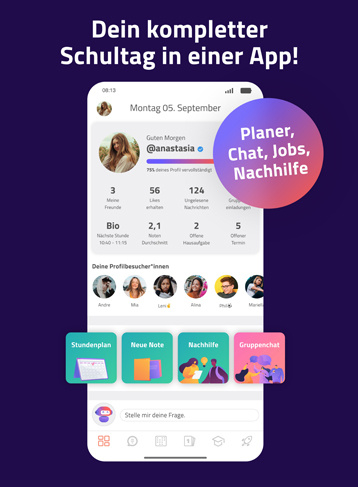Application Processes in Germany and Abroad: Differences Between Apprenticeship and Study
Apprenticeships and studies are fundamentally different, as are their application processes. It's important to know when and where to apply, what the requirements are, and which documents are needed. After graduation, career opportunities are open to you worldwide, but your application must meet the country-specific requirements. We will help you understand the nuances of applying abroad and what to look out for.

Application for Apprenticeship
Unlike university applications, you need to start applying for an apprenticeship much earlier. Not only because the deadlines are set, but also because you need time to put together your application portfolio.
Requirements
For most apprenticeship programs, at least a secondary school diploma is required. However, there are also apprenticeships where the level of education doesn't matter. Your certificates and records of internships or part-time jobs are important. Depending on the industry, additional documents like a health certificate, swimming certificate, or police clearance might be required.
Types of Applications
There are various ways to apply for an apprenticeship. You can either apply traditionally by post or electronically (online or by email). The right application method depends on the specific company.
Deadlines
If you want to start an apprenticeship, you shouldn't wait until your graduation. Especially large companies often have very long application deadlines that end 1 to 1.5 years before the apprenticeship begins. So, it's best to apply a year before your graduation.
Application for University
Getting a university place is not easy. Various factors come into play, and there are also different points to consider.
University Requirements
To study, you need the appropriate school qualification. With the general higher education entrance qualification (Abitur), you can study any course at any university. With a subject-bound higher education entrance qualification, you're only allowed to study certain subjects. If you have a Fachhochschulreife (specialized university entrance qualification), you can study at all universities of applied sciences, but also at universities offering the corresponding courses.
Types of Applications
Even when applying for a university place, you need to fill out an application form and gather documents. Most universities provide these forms on their websites. You can either print them out or fill them in online. Depending on the course, specific proof might be required.
If you want to study human medicine, dentistry, veterinary medicine, or pharmacy, you must apply through the Foundation for University Admissions in Dortmund. This organization is increasingly becoming a central point of contact for university admissions and will be the point of contact for more courses in the future.
Deadlines
Unlike apprenticeships, university applications have fixed deadlines, but they are much shorter. The winter semester starts in September or October, and the summer semester starts in April. For the winter semester, you need to apply by mid-July, and for the summer semester, usually by mid-January. However, there are exceptions. You can find more details here!
In General:
- Thorough preparation and careful compilation of documents are crucial.
- Authenticity and timely applications are key to success.
Applying Abroad
When applying internationally, it's advisable to write your application documents in at least English, as English is often used as the international business language. However, in some countries, the application is expected to be in the national language. A simple translation is often not sufficient, as different countries have different formal requirements and cultural expectations for application documents.
The rule is: Keep it short! In the US and Australia, your application package should be rather slim. There, the cover letter and your resume (also called Curriculum Vitae) are enough. The cover letter should not exceed one page, while the resume has more flexible guidelines. School certificates or job references are usually not required. More important are "references," i.e., contact details of former supervisors (in jobs or at university).

The Cover Letter
If you're applying in the US, the cover letter is the key document in your application. It's a self-presentation in which you need to show why YOU are the right candidate for the position. It's important to address the recruiter directly and personally.
The Resume
When it comes to the resume, there are differences again: In the US and Canada, your full name serves as the title, whereas in Australia or the UK, you write "Curriculum Vitae" above the tabular resume. It can be either functional (starting with your work experience) or chronological (starting with your most recent experiences). Personal details, skills, and hobbies follow. Your birth date and marital status do not need to be included, at least in the US. However, since the rules vary by country, it's advisable to research the current guidelines for applications in your target country.
The Application Photo
Here's another interesting difference: In the US or the UK, photos are unusual. In exceptional cases, companies may request a photo. Here, you should pay attention to the job ad and only include a picture if it's explicitly requested.
How is the Application Process in Other European Countries?
In other European countries, it's also uncommon to attach additional documents besides the cover letter and resume, unless specifically requested. In southern countries like Italy, France, or Spain, your application should be written in the respective national language, whereas in Northern Europe, an English version is sufficient. School and job references are unnecessary. Instead, you should provide the "references" mentioned earlier.
Conclusion
For a successful application for apprenticeship or study, whether in Germany or abroad, thorough preparation and careful compilation of documents are essential. It's important to know when and where to apply and what the requirements are. The application process differs depending on the country and educational institution. After graduation, career opportunities are open worldwide, but applications must meet the country-specific requirements. For international applications, it's advisable to write the application documents at least in English and research the specific requirements of the target country.
Author: Team scoolio



